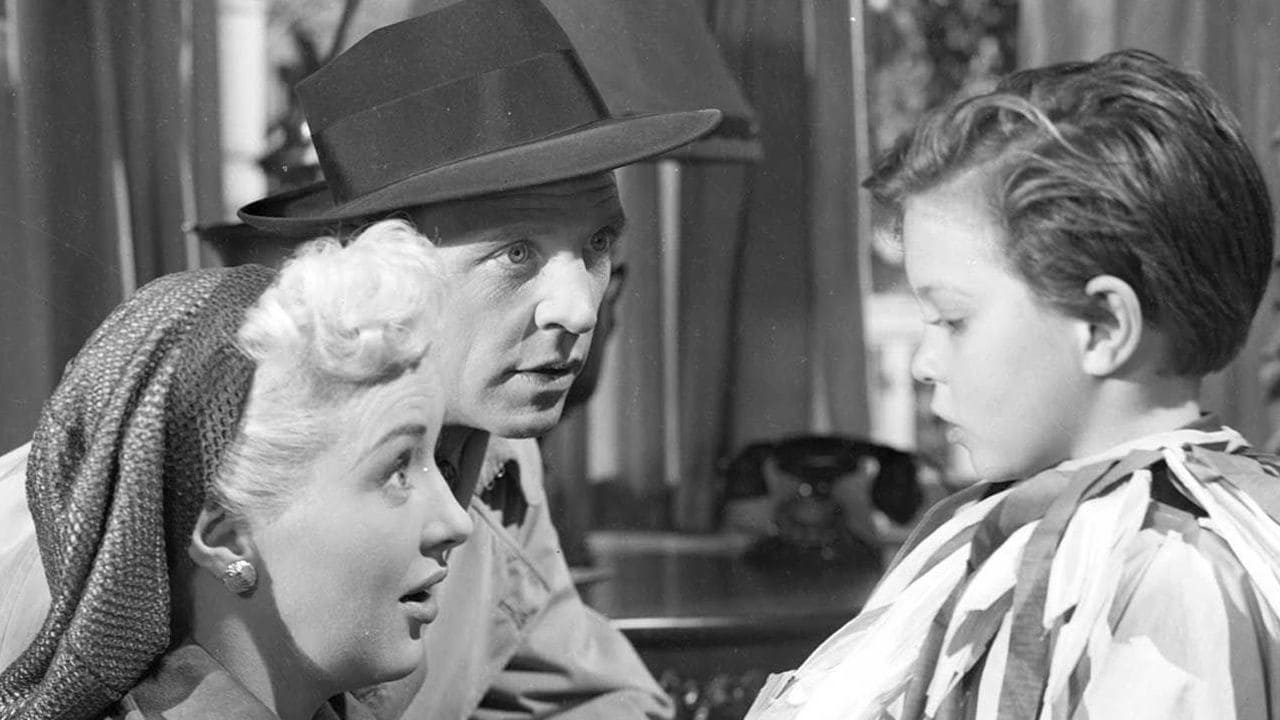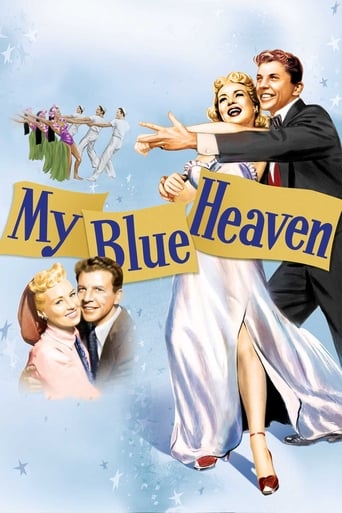Megamind
To all those who have watched it: I hope you enjoyed it as much as I do.
Helllins
It is both painfully honest and laugh-out-loud funny at the same time.
Myron Clemons
A film of deceptively outspoken contemporary relevance, this is cinema at its most alert, alarming and alive.
Lucia Ayala
It's simply great fun, a winsome film and an occasionally over-the-top luxury fantasy that never flags.
weezeralfalfa
One of 4 films Grable made with favorite male costar Dan Dailey. They made a perfect 'A' team with their vaudevillian broad entertainment talents. Her previous male costars, with matinée idol looks, could sometimes sing acceptably, do social dancing and a bit of comedy, but only Dailey could keep up with Betty in the dance routine department and match her comedic talents.This made less necessary the inclusion of supporting specialty dancers, such as the Nicholas Brothers, and multitalented supporting entertainers of either sex, such as Carmen Miranda, Charlotte Greenwood,Jack Oakie and Cesar Romero, which were standard in her films of the early '40s. Nonetheless, young newcomer Mitzi Gaynor is featured several times as a dancer-singer and girl on the make for the affections of Dan. She and Dan are featured in a sexy sophisticated dance routine while singing "Live Hard, Work Hard, Love Hard".Cleverly, Betty is watching this performance at home on her TV, and joins in, with the implication that this girl had better watch out if she makes a play for Dan(as she does). In this film, children, specifically infants, become the main focus of the melodramatic elements, rather than the on again, off again, romantic and professional relations of the stars, which was the usual source of melodrama in Betty's other musicals. As the commentary version of the 2006 DVD says, babies were an especially appropriate topic at this time, with the post-war baby boom. The periodic topic of children being an income tax deduction related to the increased income taxes following WWII.The unusual topics, especially for a musical of that period, of miscarriage and the trials of adopting a child, are featured in the melodrama. As was often the case for the romantic and professional ups and downs in previous Grable films, the ups and downs of acquiring a baby get overblown and a bit tedious.Throughout much of the film, Betty's desire to interact with an infant is frustrated by the hazard of stress-induced miscarriage, the excessive legal complications involved in adopting a child, and a very bossy nurse maid, who considers Betty too inexperienced to care properly for an infant.These problems are finally resolved in a madcap ending, thus justifying the title and theme song. As a counterweight to their frustrating experiences in trying to acquire a child of their own, they have a good time entertaining the kids of a friend with their Halloween skit. As in the later MGM musical "Always Fair Weather", the emerging competing medium of TV is incorporated into the story. Again, the often inane TV commercials are parodied, with Mitzi serving as the presenter. Anachronistically, TV pictures are presented as being in color, presumably to fit in with the rest of this color production. This was several years before the earliest color TY broadcasts, and at least a decade before color TVs were common.The "Friendly Islands" musical routine clearly is a take-off of the then smash Broadway hit "South Pacific", with Dailey parodying the operatic singing style of Ezio Pinza(duplicated by Rossano Brazzi in the later film version) and Betty sporting a wild bird-like outfit and brunette wig in the later portion, to accompany a wild dance, which Dailey joins. Reminded me more of an Aztec or African dance. Having previously played a caucasian who could dance the hula on a small South Seas island("Song of the Islands"), Betty's performance could also be interpreted as an extension of her performance in that film. In the last, long, musical number: "Don't Rock the Boat, Dear", Betty and Dan cavort on a ship in a rocky sea, symbolically reaffirming their devotion to each other. These two performances, along with the "Live Hard, Work Hard, Love Hard" number were the musical highlights for me.
lairdg
I'm as much a fan of the musicals of Hollywood's Golden Age as anyone - probably more than most - but this one stumps me.Playing radio husband and wife personalities, Dan Daily and Betty Grable, who inexplicably dance on their radio show, lurch through 90 minutes+ of mediocre songs and dances, melodrama and good ol' 1950's sexist hilarity for no discernible reason.The movie opens with a shot of Grable in her underwear, talking to a man, who we see as the camera pans, is her doctor, who gives her the good news: she's pregnant. She rushes from the office straight onto the stage of her radio show, where she proceeds to tell Dan, live on the air, through a series of vague hints, never uttering the word "pregnant".Cut to a baby shower given by their show-biz cronies during which the mother is all but ignored while the husband is subjected to a series of tasteless jokes regarding his part in the proceedings. Dan of course gets crocked - it's 1950 and everyone drinks like a fish and smokes like a chimney - and Betty has to drive them home. On the way she slams into another car and into a fire hydrant, which is played for a laugh before we discover that Betty is injured. She loses the baby, and a rather unsympathetic doctor tells her it's unlikely that she will ever have another. This is a musical comedy? This plot twist starts the couple on their quest to adopt, but the head of the agency disapproves of show folk - too unreliable. Nevertheless, they hand Betty a baby; then almost immediately snatch it back on the grounds that they are not suitable after all. There goes baby number two.The couple distract themselves by going into television and a series of lame musical numbers that not even Grable and Daily can salvage, all broadcast in brilliant color - in 1950. There is one rather bizarre spoof of the musical "South Pacific" which had opened on Broadway the year before, complete with lines taken directly from the score, and a very bad impersonation by Daily of Ezio Pinza, the Broadway lead. The question is, "Why?" The show was not brought to the screen for 8 more years, and one has to wonder just how much of the movie audience had any idea what they were doing.There is a side distraction in the person of a very young Mitzi Gaynor in her first major role, as a predatory dancer on the show with her eye on Dan. When Betty catches them playing house in his dressing room, she takes the attitude that boys will be boys and shows Mitzi the door.Another baby comes and goes - don't ask - and the whole mess ends with the original adoption agency deciding that they can have a baby after all, and Betty discovers that she's pregnant again. Now they have three babies.If you haven't given up long ago, that's their idea of a happy ending.Add a lackluster David Wayne and Jane Wyatt as a poor man's Comden and Green and the wonderful Louise Beavers in the thankless role of yet another maid, and you have a whole that is far less than the sum of its parts.Taken all in all, "My Blue Heaven" is a time capsule that you enter at your own risk.
moonspinner55
Popular radio-program duo in New York City, a chummy married couple about to make that transition to television, have troubles adopting a baby. Colorful Betty Grable vehicle weighted down with musical chaos. Granted, "My Blue Heaven" is a 20th Century-Fox musical--and anyone going into it should rightfully expect lots of singing and hoofing--but here the story is far more substantial than the song numbers, which simply get in the way. Screenwriters Claude Binyon and Lamar Trotti, working from S.K. Lauren's story "Stork Don't Bring Babies", tentatively touch upon several topical issues (both satiric and dramatic) which are not explored with any depth. The sudden boom in television (and its impact on radio), the perils of a working mother who leaves her job to be with her child, and the reluctance of adoption agencies to assign babies with those "constantly divorcing" show-biz couples are all products for a satisfying comedy-drama. Grable and Dan Dailey are a lot of fun on the dance-floor, but this glossy product could actually use less pussyfooting around and more narrative heart. It's a feel-good movie, all right, but a picture for its time and not for the ages. **1/2 from ****
bkoganbing
My Blue Heaven which starred Dan Dailey and Betty Grable are a happy show business couple who started in vaudeville and now are going into that happy new medium television. This was one of the first films that dealt with the phenomenon of television. As Dailey says during the course of the film, right now only Milton Berle and Howdy Doody are in it, the field is wide open.Dailey and Grable are a happy couple, but they'd even be happier with a child, in fact Betty loses a baby almost at the beginning of the film. Friends and sponsors, David Wayne and Jane Wyatt suggest adopting because three of their six are adopted. The rest of the film is a lighter treatment of the themes from A Penny Serenade. Things go a lot happier for Dailey and Grable than they did for Cary Grant and Irene Dunne.Because they are a musical performing couple Grable and Dailey get a whole lot of numbers and there's even a few tossed in for Mitzi Gaynor who was doing her second film. What a pity she came along as late as she did, she would have been a Grade A star in the Thirties. Gaynor plays an eager young understudy who'd just as soon Grable stay out on maternity leave.Other than the title song, there's nothing terribly memorable in the score that Harold Arlen and Ralph Blane wrote for My Blue Heaven. Of course very few songs are as memorable. Until Bing Crosby introduced White Christmas in Holiday Inn, My Blue Heaven was the largest selling song in history with Gene Austin's version topping the charts.My Blue Heaven is a pleasant enough diversion. Grable and Dailey work well as a team together, you'll enjoy them.

